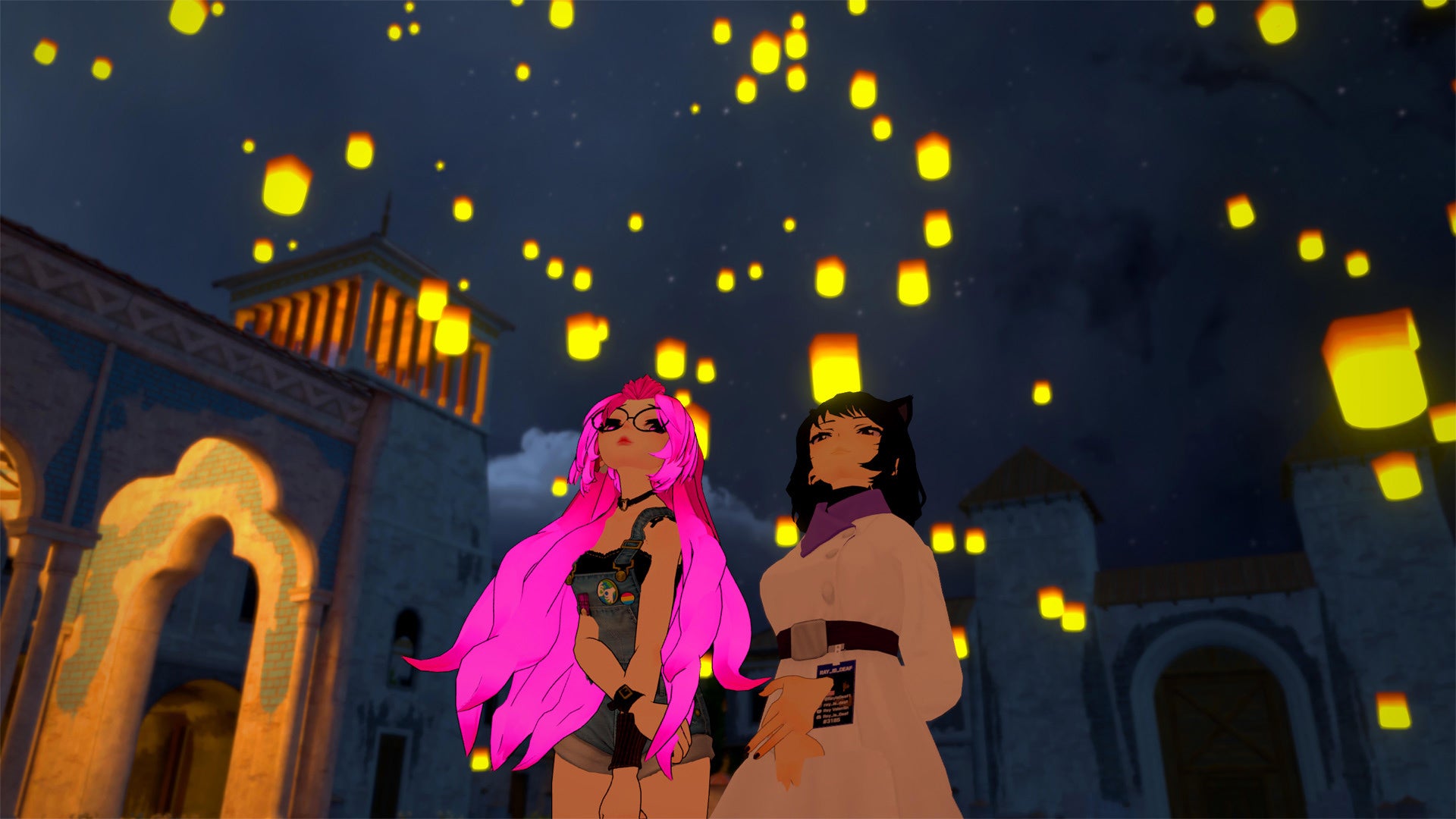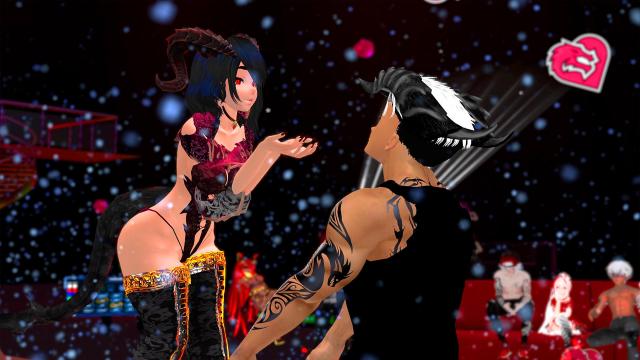Director Joe Hunting’s documentary We Met In Virtual Reality, the first to be filmed entirely in the social game VRChat, is not as compelling as its multilayered subject matter. It’s filmed at a personal range, with Hunting always hidden but his camera absorbing cartoonish faces like a curious, patient eye. It lingers on the details, the outside of windows, the dark tree leaves, the strands of hair, but Hunting is too preoccupied with virtual reality’s surface to help us carve out its core.
Dreamily and disjointedly, Hunting follows a cast of (surprisingly homogenous-looking) VRChat players through 2020, obviously, a particularly good time for physical isolation and feeling powerless. For Hunting’s cast, the allure of VRChat is the power it gives them.
A bespectacled in-game stripper, IsYourBoi, recounts slamming her human face into a wall while dancing in VR. While her real nose bled, she finished out the performance, her avatar as manicured as ever. Hunting delivers this information without commentary or a doleful, orchestral swell, opting instead to quietly dress his subjects’ fascination with VR the way Nietzsche, maybe, categorised the Übermensch — a superhuman unattached to the binding rules of fate. Hunting pushes us to consider the way VRChat is all about unbinding, about pursuing life as you imagined it, and grabbing hold of your personal power.
“You can be who you’ve always wanted to be,” says Toaster, an anime boy with animal ears and a tail who’s in love with DustBunny, an anime girl with matching animal ears and a tail. “You can, in a way, start over.”
All of We Met’s cast members have different reasons for starting over. Toaster struggled with anxiety and played VRChat on mute for two years before meeting DustBunny. IsYourBoi dealt with a family member’s death and her own alcoholism before finding respite and even marriage in VR. In one of the movie’s most poignant scenes, we see Ray_is_Deaf, who teaches American Sign Language in VRChat, using the game to heal from his brother’s suicide.
Standing with Jenny0629, another in-game ASL teacher, Ray powers up a floating yellow lantern and names it his brother’s spirit going to heaven. We see the orange-tipped light go up, up into the cloudy night sky. The sky looks real, sometimes, until you notice that there are too many stars. Or something seems to be switched off. Like Jenny says later while lying in the grass (in reality, her carpet): “I wish the clouds would move. […] Trying to see if I could see any shapes in the clouds. I can’t.”
Hunting doesn’t mind. He’s more interested in these people that shrug off the physical in exchange for the unburdened digital. The camera drinks in the looseness — the virtual bodies that glitter and change eye colours like shoes — and the tight knit of the relationships borne from it. On this topic, professor of cinema studies Barbara Creed wrote in her 2003 book Media Matrix that the “global self” is “virtual, fluid, conscious of both its immediate local world […] and of the other ‘worlds.’”
We and Hunting can find the global self breadcrumbed throughout VRChat. The documentary’s subjects are enamoured by being able to transcend their bleak realities, taking refuge in the things they’ve seen, learned, and gathered on the global platform. They can attest to their avatars creating a purer version of themselves while yearning for IRL meet ups and finding no contradiction there. Online, to them, is a place of celebration, where they can come together, giggling, for a New Year’s Eve party, or sobbing during IsYourBoi’s virtual wedding, as genuinely as you might have once from a real church pew.

Ray lets the lantern go, people cry and coo during the wedding, but instead of relishing this permeable real, virtual world, I got stuck on the incomplete bigger picture. And, unfortunately, the glitches. They might not be memorable to those already familiar with VRChat, but for the wider audience that We Met seeks to introduce the game to, the choppiness will set fire to any ambitious metaverse expectations. The truth is no Tron, and even I found messy visuals stark against the film’s refusal to address them, as well as against HBO Max’s sleeker reality-bending offerings like Irma Vep and Belle.
VRChat’s technical pitfalls distract from the relationships We Met would much rather us focus on. During a party scene, I liked witnessing the revelry, the bunnies and hot girls coming together as one, but I was put off by the hands phasing through glasses of beer. I laughed during IsYourBoi’s wedding, when her avatar’s time and space-defying breasts bounced worriedly as she walked down the aisle.
I found myself forming more questions about VR as I watched instead of being satisfied with We Met’s cheery answers. Lovingly, Hunting prescribes what French sociologist Jean Baudrillard described in Simulacra and Simulation about Disneyland to VRChat, “what draws the crowds is undoubtedly much more the social microcosm, the miniaturized and religious reveling in real America, in its delights and drawbacks.”
But VRChat is not yet deserving of what Baudrillard calls the “hyperreal,” the moment when Disneyland becomes more vibrant and serious than the beige world that made it. The glitches, immortalised now in this movie and the YouTube and Twitch footage that predates it, tells us that VRChat is still, in many ways, an infant reality.
It’s also spotted with teenage shenanigans and racists, which a general population might not know, but those familiar with VRChat will feel missing from the documentary. Hunting never touches VRChat’s uglier, laggier bits, nor does he explore if VR could change a person’s real life and relationships for the worse. There’s no acknowledgement that all the copyright stuff that makes VRChat so “freeing” is constantly under threat, and likely to disappear if the metaverse truly takes off. And it doesn’t escape me that, in a game where your avatar can be anything you cook up, the most popular one is a light-skinned, big-bosomed anime girl. I want to know more about all of that. At present, our burgeoning glitchy “metaverse” doesn’t supersede reality — it borrows and hides from it. But We Met insists with a well-meaning smile that we are in the future, and the future is uncomplicated.
It is amazing and sometimes even beautiful to watch Hunting’s cast sway to Perfume Genius and nuzzle their flickering faces together. I can’t ignore, either, that the documentary is historic — it legitimises virtual worlds by filming entirely in one. It’s clear that Hunting takes video games refreshingly seriously, but we’re still wading in the virtual world’s impact on our lives when we should be diving in.

Leave a Reply